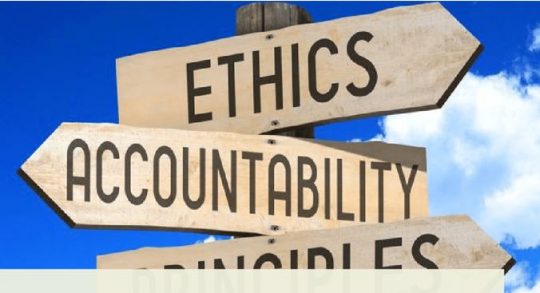Widgetized Section
Go to Admin » Appearance » Widgets » and move Gabfire Widget: Social into that MastheadOverlay zone
Why are Ethical Standards Important for Nonprofit Practices and Transparency?
The views expressed are those of the author and do not necessarily reflect the views of ASPA as an organization.
By Sharif Shamroukh
October 24, 2021

The first thought that comes to mind when discussing matters related to nonprofit organizations or the philanthropy sector, in general, could be the amount of confidence that a person may have towards the practices and activities that nonprofit organizations apply to succeed with their missions. This way of thinking may be justified due to the escalating abuses of trust in the philanthropy sector. Thus, nonprofit organizations rely precisely on the public trust to perform their work and, most importantly, to maintain their resource development goals. That is why it is highly important for nonprofit organizations to continuously earn their constituents’ trust through ethical practices that are well-defined, such as accountability, transparency and various ethical practices that the governing board of the organization abides with.
As a result of understanding the sensitivity of ethical practices within all levels of nonprofit activities, unethical behavior becomes a core concern that a nonprofit organization’s governing board focuses on to avoid any potential damages as a result of abuse of trust or mishandling practices. When loss of trust is limited to a few concerned constituents, it is too often due to the adverse effects of unethical practice within the organization. Therefore, understanding this issue becomes the motive behind putting together the best practices that lead to ethical behavior and avoid any catastrophic results for mishandling duties within the nonprofit organization.
Consequently, areas of sensitive practices may consist of unclear areas where interpretation of practices may carry multiple answers that make it challenging to identify any unethical behavior. Note that following the law and applying government regulations is not enough to justify ethical practices; in fact, ethical behavior is more about learning and using the spirit of the law and government regulations than it is about a personal commitment to ethical practice. Throughout the history of the philanthropy sector, there were plenty of examples of violating ethical standards while not committing an identified crime or violating government regulations. Therefore, stating that someone abiding by the law and following specific government regulations does not justify or state ethical practice for nonprofit board members, simply because there are areas that require personal consciousness to avoid unethical behavior.
Accordingly, here are a few points for nonprofit leadership to apply within their respected organizations to warrant more ethical practices and to support their constituents to build more substantial confidence in their organizations and avoid possible failures and catastrophic outcomes:
First and foremost is establishing ethical standards that every individual involved in nonprofit organization follows and regularly maintains to meet any changes and new developments. In contrast, this sounds like theoretically an easy step; practically, it will be doable and successful if the governing board desires to enforce this process. As a result of maintaining documented ethical standards, possible mishandling of practices will be diminished. Further, having such measures in place would build a more substantial support base and sustain the transparency and accountability of nonprofit practices.
Another significant benefit for following ethical practices is that it will positively affect the outcome of the organizations’ desire for resources. Therefore, when donors have no concerns about the organizations’ ethical practices, they become more willing to answer the organizations’ call for financial support. As previously mentioned, gaining an individual’s trust is essential for the fundraising goals of nonprofit organization, and following well-prepared ethical standards will only enhance the organizations’ efforts to reach their resource development goals.
One of the grey areas where nonprofits may violate ethical standards is a conflict of interest; the governing board and staff of nonprofit organizations may not notice how this violation may cause painful destruction to their respected organizations. Therefore, while building ethical standards, nonprofit boards should consider updating this policy and highlighting the conflict of interest so that all involved individuals will avoid falling into this sensitive unethical violation.
One of the ethical practices is to maintain documented records and build a secure environment where constituents feel confident towards the nonprofit organization. Constituents should understand that their personal information is well protected, the organization is transparent about any activity and that there is a process where constituents can have access to all documents at any time while maintaining the privacy of personal information. Further, nonprofit organizations should apply disclosure requirements so that donors feel the nonprofit organization’s leadership is committed to transparency and values accountability. These things, if applied, would convince the organization’s constituents to give more donations and make continuous commitment to support the organization’s needs.
As a final thought on this crucial topic, applying ethical standards requires thinking of ethics as a two-faced coin. The nonprofit organizations perform one side as a core pillar for successful long-term practice, which is explained here. The other side of this coin is determined by donors and committed supporters of the nonprofit organization. Once they feel confident about their respected organization, they will make more commitments to support the organization in any possible capacity, which is another critical factor for the nonprofit’s success.
Author: Dr. Sharif Shamroukh is a Senior Lecturer at the American Institute for Philanthropy Advancement, and frequently writes about various public policy issues. Also, Dr. Shamroukh provides consulting services to nonprofit organizations covering a wide range of topics that help achieve their missions.
Contact Dr. Shamroukh via e-mail: [email protected] or Facebook / LinkedIn / Twitter @DrShamroukh


Abdelhafez Shamroukh
October 31, 2021 at 12:04 pm
Very good article Dr. Shamroukh
I think ethics is an important characteristic of business as well as long as human factor is involved